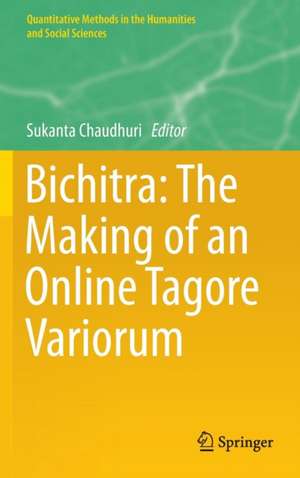Bichitra: The Making of an Online Tagore Variorum: Quantitative Methods in the Humanities and Social Sciences
Editat de Sukanta Chaudhurien Limba Engleză Hardback – 25 feb 2016
The name Bichitra, meaning "various" in Bengali, alludes both to the great variety of Tagore’s works and to their various stages of composition. Beyond their literary excellence, they are notable for their sheer quantity, the number of variant forms of a great many items, and their afterlife in translation, often the poet’s own. Seldom if ever has the same writer revised his material and recast it across genres on such a scale. Tagore won the Nobel Prize in 1913.
By its value-added presentation of this range of material, Bichitra can be a model for future databases covering an author’s complete works or other major corpus of texts. It offers vastly expanded access to Tagore’s writings, and enables new kinds of research including computational text analysis. The “book of the website” shows in technical and human terms how researchers with interests in art, literature and technology can collaborate on cultural informatics projects.
| Toate formatele și edițiile | Preț | Express |
|---|---|---|
| Paperback (1) | 381.21 lei 43-57 zile | |
| Springer International Publishing – 27 mar 2019 | 381.21 lei 43-57 zile | |
| Hardback (1) | 388.52 lei 43-57 zile | |
| Springer International Publishing – 25 feb 2016 | 388.52 lei 43-57 zile |
Din seria Quantitative Methods in the Humanities and Social Sciences
- 17%
 Preț: 525.40 lei
Preț: 525.40 lei - 17%
 Preț: 393.97 lei
Preț: 393.97 lei - 18%
 Preț: 904.74 lei
Preț: 904.74 lei - 18%
 Preț: 1137.55 lei
Preț: 1137.55 lei - 18%
 Preț: 1015.70 lei
Preț: 1015.70 lei -
 Preț: 416.40 lei
Preț: 416.40 lei - 18%
 Preț: 787.47 lei
Preț: 787.47 lei - 18%
 Preț: 780.52 lei
Preț: 780.52 lei -
 Preț: 483.92 lei
Preț: 483.92 lei - 18%
 Preț: 1117.50 lei
Preț: 1117.50 lei - 18%
 Preț: 943.57 lei
Preț: 943.57 lei - 15%
 Preț: 643.48 lei
Preț: 643.48 lei - 18%
 Preț: 729.68 lei
Preț: 729.68 lei - 18%
 Preț: 734.09 lei
Preț: 734.09 lei - 18%
 Preț: 905.23 lei
Preț: 905.23 lei -
 Preț: 388.52 lei
Preț: 388.52 lei - 18%
 Preț: 894.34 lei
Preț: 894.34 lei -
 Preț: 353.99 lei
Preț: 353.99 lei - 18%
 Preț: 727.31 lei
Preț: 727.31 lei
Preț: 388.52 lei
Nou
Puncte Express: 583
Preț estimativ în valută:
74.34€ • 77.82$ • 61.88£
74.34€ • 77.82$ • 61.88£
Carte tipărită la comandă
Livrare economică 31 martie-14 aprilie
Preluare comenzi: 021 569.72.76
Specificații
ISBN-13: 9783319236773
ISBN-10: 3319236776
Pagini: 159
Ilustrații: XV, 159 p. 88 illus., 64 illus. in color.
Dimensiuni: 155 x 235 x 11 mm
Greutate: 0.43 kg
Ediția:1st ed. 2015
Editura: Springer International Publishing
Colecția Springer
Seria Quantitative Methods in the Humanities and Social Sciences
Locul publicării:Cham, Switzerland
ISBN-10: 3319236776
Pagini: 159
Ilustrații: XV, 159 p. 88 illus., 64 illus. in color.
Dimensiuni: 155 x 235 x 11 mm
Greutate: 0.43 kg
Ediția:1st ed. 2015
Editura: Springer International Publishing
Colecția Springer
Seria Quantitative Methods in the Humanities and Social Sciences
Locul publicării:Cham, Switzerland
Public țintă
ResearchCuprins
The Story of the Bichitra Project.- Tagore's Text.- The Bengali Writing System: Fonts and OCR.- Images and Scanning.- Manuscripts and Their Transcription.- Data Management and Hyperbibliography.- Search Engine and Hyperconcordance.- Collation: Prabhed and its Predecessors.- Planning the Website.- Beyond Bichitra.- Appendix.
Notă biografică
Sukanta Chaudhuri, the editor of this volume, is Professor Emeritus at Jadavpur University, Kolkata, and was Founder-Director of its interdisciplinary School of Cultural Texts and Records. He was Co-Ordinator of the Bichitra Online Tagore Variorum and General Editor of the Oxford Tagore Translations series. He is also a scholar of the European Renaissance and of textual and editorial theory.
About the project:
Bichitra was prepared in just over two years at the School of Cultural Texts and Records by a team of thirty project staff plus many specialist contributors and consultants. It was funded by the Ministry of Culture, Government of India, to commemorate Tagore’s 150th birth anniversary in 2011. The site is freely accessible, with apparatus in English, Bengali and Hindi, at
http://bichitra.jdvu.ac.in/
About the project:
Bichitra was prepared in just over two years at the School of Cultural Texts and Records by a team of thirty project staff plus many specialist contributors and consultants. It was funded by the Ministry of Culture, Government of India, to commemorate Tagore’s 150th birth anniversary in 2011. The site is freely accessible, with apparatus in English, Bengali and Hindi, at
http://bichitra.jdvu.ac.in/
Textul de pe ultima copertă
This book documents the creation of the Bichitra Online Tagore Variorum, a publicly accessible database of Rabindranath Tagore's complete works in Bengali and English totaling some 140,000 pages of primary material. Chapters cover innovative aspects of the site, all replicable in other projects: a hyperbibliography; a search engine and hyperconcordance working across the database; and a unique collation program comparing variant texts at three levels. There are also chapters on the special problems of processing manuscripts, and on planning the website. Early chapters take readers through the history of the project, an overview of Tagore’s works, and the Bengali writing system with the challenges of adapting it to electronic form.
The name Bichitra, meaning "various" in Bengali, alludes both to the great variety of Tagore’s works and to their various stages of composition. Beyond their literary excellence, they are notable for their sheer quantity, the number of variant forms of a great many items, and their afterlife in translation, often the poet’s own. Seldom if ever has the same writer revised his material and recast it across genres on such a scale. Tagore won the Nobel Prize in 1913.
By its value-added presentation of this range of material, Bichitra can be a model for future databases covering an author’s complete works or other major corpus of texts. It offers vastly expanded access to Tagore’s writings, and enables new kinds of research including
computational text analysis. The “book of the website” shows in technical and human terms how researchers with interests in the arts, literature and technology can collaborate on cultural informatics projects.
The name Bichitra, meaning "various" in Bengali, alludes both to the great variety of Tagore’s works and to their various stages of composition. Beyond their literary excellence, they are notable for their sheer quantity, the number of variant forms of a great many items, and their afterlife in translation, often the poet’s own. Seldom if ever has the same writer revised his material and recast it across genres on such a scale. Tagore won the Nobel Prize in 1913.
By its value-added presentation of this range of material, Bichitra can be a model for future databases covering an author’s complete works or other major corpus of texts. It offers vastly expanded access to Tagore’s writings, and enables new kinds of research including
computational text analysis. The “book of the website” shows in technical and human terms how researchers with interests in the arts, literature and technology can collaborate on cultural informatics projects.
Caracteristici
Covers in detail the creation of a multi-level collation engine that can be applied to all languages and alphabets, a definitive, statistics-based innovation of the variorum Shares a digital humanities project database or variorum and its original software created by researchers at Jadavpur University The database, a cultural informatics triumph that ensures the preservation of Tagore's original manuscripts, may also be used for computational analysis of his work














